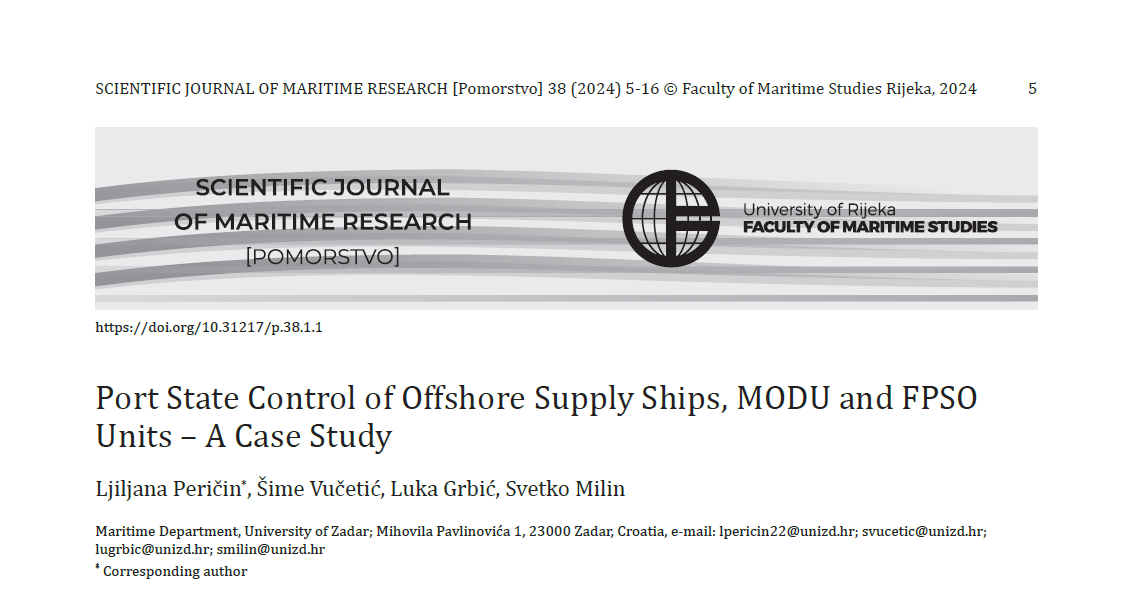Port State Control of Offshore Supply Ships, MODU and FPSO Units - A Case Study
Keywords:
Paris MoU, Port State Control, inspection, offshore, the Adriatic seaAbstract
The Port State Control system aims to ensure that all ships are subject to regular inspections, with particular attention to the ships of insufficient quality. To this end, during the inspection, priority is given to ships that are considered risky. Thetis database is an information system that contributes to the implementation of the Port State Control within the EU (European Unit). It contains data on inspections performed in the EU ports and the Paris Memorandum area. The Paris Memorandum has 27 member states and covers the waters of European coastal states and the North Atlantic basin from North America to Europe. The main goal of the Paris MoU (Memorandum of Understanding) is to eliminate substandard ships through a harmonized Port State Control system. Namely, inspections should ensure that ships meet international safety standards, are safe for the environment, and provide adequate living and working conditions for workers. The primary responsibility for ensuring these standards rests with the ship owner/shipper while the responsibility for ensuring such compliance rests with the flag state. The aim of this analysis is to determine the number of inspections performed in the ports of the Republic of Croatia and the Republic of Italy, to identify the cause of ship detentions and the most common deficiencies of offshore supply vessels, MODU (Mobile Offshore Drilling Units) and FPSO (Floating Production Storage and Offloading) Units. In the observed period, the impact of the crisis caused by the COVID-19 pandemic was significant, resulting in the decline in the numbers of inspections performed in 2020 and 2021. In 2022, the number of inspections increased, but it still has not reached its pre-pandemic level. During the period that was the subject of research, port state inspections in the Republic of Croatia and the Republic of Italy revealed 241 deficiencies. Five areas with the largest number of deficiencies are: Certificate & Documentation, Safety of Navigation, Fire Safety, ISM, and Life-saving appliances, which follow the trend of the lack in the areas of the Paris Memorandum. The greatest increase in deficiencies was recorded in the areas of Labor Conditions-Health protection, Certificate & Documents (Crew Certificate, Documents), Emergency System and Fire safety area, which led to an increase in the number of offshore supply ships retention during the first half of 2022.

Published
Issue
Section
License
Copyright (c) 2024 Editor; Mrs.

This work is licensed under a Creative Commons Attribution-NonCommercial-NoDerivatives 4.0 International License.
Scientific Journal of Maritime Research understands the need for authors to disseminate and maximize the impact of their research. When submitting an article for publishing in Scientific Journal of Maritime Research, it implies that the Corresponding Author transfers, with the consent of all Coauthors, the copyright ownership in the referenced submission, including all versions in any format now known or hereafter developed, to the Scientific Journal of Maritime Research.
Copyright protects your original work and research material and prevents others from using it without your permission. Others will be required to credit you and your work properly, thus increasing its impact. Should your submission be rejected or withdrawn prior to acceptance for publication by Scientific Journal of Maritime Research, this transfer will be null and void.
Authors, users or readers of an article need clear instructions on how they can use the article. Scientific Journal of Maritime Research uses the Creative Commons Attribution-NonCommercial-NoDerivatives (CC-BY-NC-ND) 4.0 International License, which governs the use, publishing and distribution of articles by authors, publishers and the wider general public.
The authors are allowed to post a digital file of the published article, or the link to the published article (Scientific Journal of Maritime Research web page) may be made publicly available on websites or repositories, such as the Author’s personal website, preprint servers, university networks or primary employer’s institutional websites, third party institutional or subject-based repositories, and conference websites that feature presentations by the Author(s) based on the published article, under the condition that the article is posted in its unaltered Scientific Journal of Maritime Research form, exclusively for non-commercial purposes.




